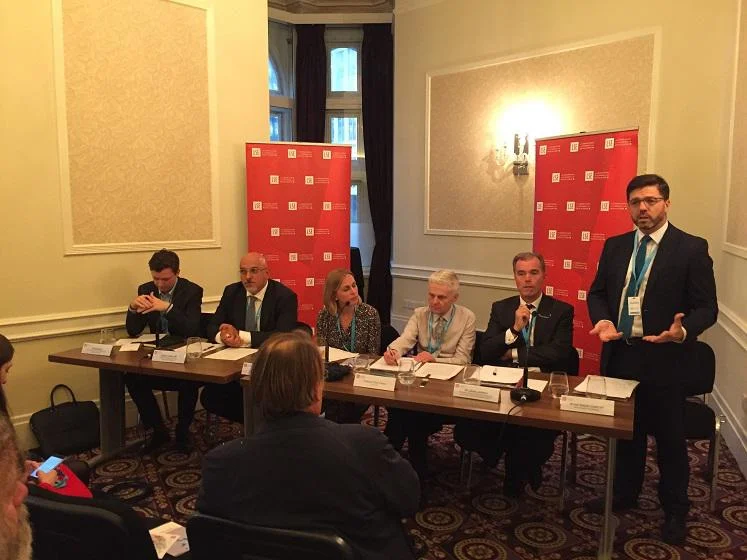LSE at 2019 political party conferences

How can we increase the UK’s regional prosperity? By reforming a system that is too London-centric, handing back economic and political power. That was the consensus from the two LSE hosted panel discussions at the Labour and Conservative party conferences, uniting the two rival parties on one of the most enduring challenges for central government.
Those attending the party conferences were certainly interested in how we help our regions. It was standing-room only at the event at the Conservative conference in Manchester to listen to James Jamieson, Chairman of the Local Government Association, Stephen Crabb MP, Minister for Industry and Business Nadhim Zahawi MP, and Edwin Morgan of the Institute of Directors.
Professor Tony Travers chaired both LSE events, and LSE Innovation Fellow Dr Anna Valero was also a panelist.
Is London’s economic success a make life more difficult for the rest of the UK? All the panellists recognised that London’s success leaves most of the UK in its slipstream. Crabb praised London's dynamism but said the UK had a "ridiculously lopsided" system and said he "feels the inequality" when he travels around the UK.
There was general agreement that the government should intervene in the economy to support regional development to help other areas emulate London’s economic success.
Dr Valero suggested that a non-partisan, long-term industrial strategy should introduced, and protected from the political cycles. She added that an annual report on the state of business, making use of business data available, would help government to target investment and skills.
Zahawi said there should be "less dogma, more practicality" in response to a question on whether the Conservative party should champion industrial strategies. He added he was not "afraid to be an interventionist; as long as it follows the evidence." Jamieson took a more cautious view, saying "the state should not act like entrepreneurs but it has a huge role to play".
The audience responded warmly to Dr Valero’s suggestion of ‘smart cities,’ by devolving political and fiscal powers and enabling local residents to have a greater say in local investment. "Polluted, congested, unattractive cities harm productivity," she said.
The biggest issue hanging over both conferences was the challenges posed by Brexit. Most economists agree that any form of Brexit will hurt the UK economy in the short term, hindering central government’s capacity to support regional growth.
Crabb spoke about the growth initiatives in Wales and acknowledged that, for example, the Welsh Government is currently a benefactor of European Union payments. He said he hoped for a "collaborative" approach to plug any loss of funding in the event that Brexit happens.
At the Labour conference in Brighton the panel included Hilary Benn MP, Steve Rotheram, Mayor of the Liverpool Region, and Jasmine Whitbread, Chief Executive of London First.
The panel agreed that regional prosperity was dependent on handing over economic, growth and skills responsibilities away from Westminster. Rotheram said: "Locals know what their priorities are, we need to trust them."
One audience member pointed out that cooperation between regions, and importantly with London, was essential so that development was not seen as a zero-sum gain with winners and losers. Whitbread responded that in the past regions may have seen each other as in competition, but there has been a cultural change in recent years where regions are more likely to be seen as partners.
What practical steps did both panels offer? Dr Valero put forward the idea of human capital tax credits, an incentive for organisations to invest in the training of their workers. She added that developing the government’s ‘Business Basics’ fund, encouraging businesses to adopt technology and management techniques, was also an effective way to boost productivity.
The panel at the Labour conference alighted on the huge opportunities linked to the green economy after a law passed in June 2019 committing the UK to net zero carbon emissions by 2050.
Dr Valero said: "Creating the infrastructure needed to produce clean energy by this deadline presents the regions and the government with a means to reinvent themselves."
She added that the UK’s Industrial Strategy should be combined with the Clean Growth Strategy ensure the skills capacity is ready for ‘the fourth industrial Revolution’.
Both events showed the strong support for locally-led investment and increased political powers for the UK’s regions. With a general election imminent, the next step for the party that leads the next government is to use the consensus to improve the lives and increase opportunities for everyone in the UK.